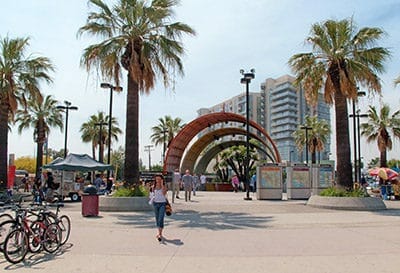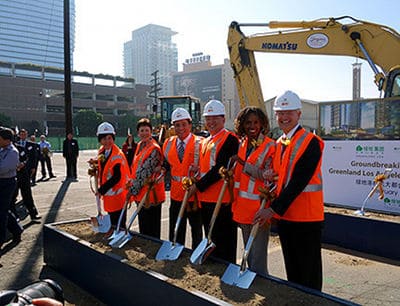
An artist’s rendering shows the North Hollywood project behind the Red Line station
Shanghai’s Greenland Group, China’s second-largest real estate developer by sales, is part of a team that has won first-round approval for developing a mixed-use project that could involve building as much as 232,000 square metres (2.5 million square feet) of space and create up to 1,500 new homes in North Hollywood, California.
The North Hollywood deal would see the Chinese company teaming with one of America’s largest developers for project well away from the Los Angeles city centre, as mainland developers take on more projects outside major urban hubs.
Greenland Group has been one of China’s most aggressive cross-border real estate investors, with projects being built in Australia, the UK and Southeast Asia, as well as the US. The state-owned company already has the $1 billion Metropolis project underway in downtown Los Angeles.
Mainland Developer Teams Up with Trammell Crow

Greenland chairman Zhang Yuliang has been a pioneer of China’s cross-border real estate investment
Greenland’s proposal, which was selected by Los Angeles authorities last month, is a joint effort with Trammell Crow, a unit of property services firm CBRE, to form a public-private venture with the Los Angeles County Metropolitan Transportation Authority to develop nearly 16 acres (6.5 hectares) around the North Hollywood station of the Red Line light rail system.
The two companies are said to be holding talks with design firms including Gensler, Killefer Flammang Architects, HKS Architects and Melendrez to come up with detailed plans.
Greenland Group and Trammell Crow have already brought forth two general proposals, according to a report in the Los Angeles Times. The first calls for 1,500 housing units, 150,000 square feet (14,000 square metres) of retail, and 450,000 square feet (42,000 square metres) of office space, with the final footprint totaling 2.5 million square feet (232,000 square metres). A smaller proposal would cut those totals to 750 housing units, 40,500 square feet of retail, and 200,000 square feet of office space.
The LA County Transportation Authority has authorized negotiations to begin on the development, a first step toward an agreement on the specifics of a final project. The site currently hosts a parking lot and bus station, but is the largest plot of Transit Authority-owned land in the county and city officials have been pushing for more housing near transit hubs.
If all goes as planned, the final North Hollywood proposal is anticipated to be voted on by the Transit board before the end of 2018, with construction commencing in 2019.
Greenland Group Discovers Partnerships

Greenland Group broke ground on the $1B Metropolis project in LA in 2014
While Greenland Group preferred to go solo on most of its early cross-border investments, the mainland giant seems to be developing a taste for partnerships in recent months.
When the Shanghai-listed company took on the development of the 1,500 condos in the Metropolis project, along with accompanying retail space and a hotel in 2013, it decided to go it alone. However, in recent months Greenland has been shopping what’s described as a significant stake in its Pacific Park project in Brooklyn to potential buyers, and has shown other signs of hedging its risks.
Greenland just last week offered to include the hotel component of the Metropolis project into a Singapore-based real estate investment trust (REIT). Greenland’s acquisition of a 41 percent stake in New York’s Park Lane Hotel during May also allowed the Chinese company to invest without committing cash to a project. In that transaction Greenland took over a stake which had earlier belonged to a firm tied to Malaysia’s 1MDB fund scandal in return for new shares issued by a Hong Kong-listed Greenland subsidiary.
Unconfirmed reports in the mainland press have said that the state-run company has been facing pressure from Chinese authorities to curb its overseas investments as Beijing struggles to control outbound capital flows this year. The company is also among the most heavily indebted of China’s real estate developers.
Leave a Reply